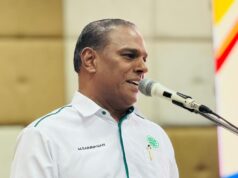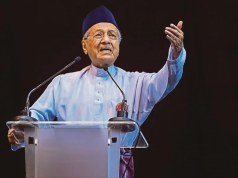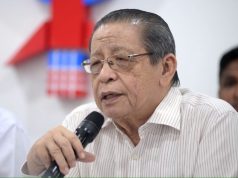SINGAPORE, Feb 28 – Datuk Seri Najib Tun Razak, the architect of numerous government transformation programmes and the 1Malaysia concept, is the preferred choice of Sabahans to continue as the prime minister of Malaysia, said Sabah Legislative Assembly Speaker Datuk Seri Salleh Said Keruak(Pic), reiterating that “there will be no political tsunami hitting Sabah in the upcoming general election”.
He said this was evident from the strong grassroots support and large turnout to welcome Najib during his recent visit to Sabah to drum up support ahead of the general election that has been called “the mother of all battles”.
Salleh said this was also consistent with the findings of a recent survey conducted by the Merdeka Centre, rating Najib’s popularity at the comfortable level of more than 70 per cent.
“With the magic touch of Najib’s 1Malaysia concept in transforming the country for a better future, I believe the voters will return BN in the 13th General Election to continue to rule Sabah with a comfortable majority.
“Having said that, I do not think a polls tsunami will hit Sabah,” he said in his lecture, entitled “Malaysian 2013 General Election: Will Polls Tsunami Hit Sabah?”, at the S. Rajaratnam School of International Studies, Nanyang


Salleh said the 13th general election was an important election for the ruling BN as “it is perceived as a test of Najib’s popularity as he needs a strong mandate to continue to rule Malaysia”. The former Sabah chief minister expressed confidence that although the state BN component parties — PBS (Parti Bersatu Sabah), LDP (Liberal Democratic Party), UPKO (United Pasokmomogun Kadazandusun Murut Organisation), PBRS (Parti Bersatu Rakyat Sabah) MCA and Gerakan — were likely to face a tough challenge in certain areas from the opposition, the BN would win the Sabah state election, with “Umno expected to retain all the 32 seats it currently holds”.
According to Salleh, a notable political scientist, his confidence was based on several factors, including the failure of the opposition in Sabah to form a strong pact and the absence of a strong Chinese leader in the opposition. Salleh observed that PKR also lacked credible Kadazandusun leaders and “no credible Muslim-Bumiputera leader to strengthen Muslim support in PKR”.
Apart from Pakatan Rakyat (Parti Keadilan Rakyat, PAS and DAP), there are two other opposition parties, namely Sabah-based SAPP (Sabah Progressive Party or Parti Maju Sabah) and Sarawak-based State Reform Party (Star), and for now, it appears that both Pakatan Rakyat and SAPP or Star will fight each other rather than go for one-to-one fights against the mighty ruling coalition in the upcoming general election. Salleh said 25 parliamentary seats and 60 state seats were at stake in Sabah, and of the 25 parliamentary seats, 20 were held by the BN and five by the opposition. Of the 25 parliamentary seats, 11 are Muslim-Bumiputera majority, eight Kadazandusun Murut (KDM) majority, two Chinese majority and four mixed seats while out of the 60 state seats, 31 are Muslim-Bumiputera majority, 17 are KDM-majority, eight are Chinese-majority, and four are mixed seats.
In the 2008 general election, Sabah BN nearly made a clean sweep, winning 59 of 60 state seats and 24 of the 25 parliamentary seats contested. However, SAPP left the BN on Sept 17, 2008. He said that with Sabah’s contribution of 24 parliamentary seats, the state had since been regarded as BN’s “stronghold or fixed deposit” and was expected to be the frontline battleground in the 13th general election, particularly in the urban and suburban areas. On the recent establishment of the much-awaited Royal Commission of Inquiry (RCI)on Illegal Immigrants that was well-received by political leaders and the people alike in Sabah, he described it as a step in the right direction which symbolised the federal government’s seriousness in tackling the perennial problem.
Expressing optimism about the ruling BN’s chances in the coming general election, Salleh said the opposition in Sabah appeared to be “organisationally and structurally weak” as evident from their failure to form a united force to take on the giant BN machinery.
“The ‘Semenanjung Agenda’ vs the ‘Borneo Agenda’ has deepened the animosity between the Pakatan Rakyat and the United Borneo Front (UBF),” he said.
Salleh stressed that the Kadazandusun Murut community (KDM) support for charismatic Tan Sri Joseph Pairin Kitingan (of PBS) remained firm as many had shunned the Star Sabah Chapter chairman Datuk Dr Jeffrey Kitingan’s ‘Sabah for Sabahans’ battle cry.
“The show of unity by Pairin, Tan Sri Joseph Kurup (of PBRS) and Tan Sri Bernard Dompok (of UPKO) recently is a symbolic gesture that all the Kadazandusun leaders are prepared to set aside their differences to ensure a big win for the BN,” he said, adding that the opposition had failed to establish itself as an alternative party to the BN in Sabah.
BERNAMA










